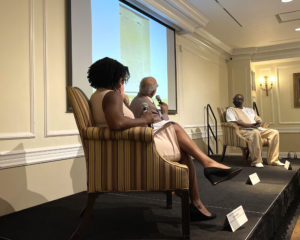
On July 28, the Women’s National Democratic Club’s Educational Foundation and the DC History Center hosted a panel discussion and book-signing with Judge Rohulamin Quander, author of The Quanders: Since 1684, An Enduring African American Legacy. This book details one of the oldest continuously documented African American families in the country from Ghana to the DC area.
The first American Quanders were enslaved in Maryland and Virginia, including at President George Washington’s Mount Vernon plantation. Following generations of enslavement, the family has produced U.S. Army generals, Tuskegee Airmen serving in World War II, and the first national president of the Alpha Kappa Alpha Sorority, Inc. Their stories alone are powerful and engaging snapshots of American history. Judge Quander’s dedication to telling and preserving this story is a remarkable testament to his own family but it also speaks to the importance of personal stories in social studies education.
Laura Brower Hagood, executive director of the DC History Center opened the program with a passage that captures the spirit of the book: “17th-century Quanders had no sense of how history would remember them. Life was hard, and their focus was on daily survival. Being Black in America was difficult and still is… But they stood up for themselves anyway, and in the face of interminable racism, they claimed their rights, sought redress, and worked to see that no one took unfair advantage of their color, their poverty, or their lack of education…”
Educators are constantly challenged to help students understand the relevance of the past. Social studies teachers Ms. Alysha Butler of McKinley Technology High School and Mr. Emory Calhoun of Dunbar High School, joined Judge Quander to delve into the continued importance of this story to educating future generations and writing a more complete history of the United States. Emphasizing the value of primary sources and research, they explored how they might use The Quanders in the classroom.
Balancing a difficult history with stories of highly successful individuals, the panelists also discussed some of Judge Quander’s most complex family members, in particular Mr. Felix Quander born shortly after the Civil War. Described by Quander as a “ruffian,” Calhoun emphasized that it’s these stories that feel familiar, relatable, and even close to students’ experiences—proving useful in the classroom as a means to better understand the past. And there are other modern parallels as well. Judge Quander dedicated The Quanders to the memory of George Floyd on which he commented, “We have to remember we are on a mission and we have a long way to go. There’s a lot of work to do.”
This program marked the DC History Center’s cautious return to in-person programs. Thirty participants joined us in-person while the program was simultaneously streamed live via Zoom—now available via the WNDC Educational Foundation’s YouTube. We continue to assess changing circumstances and the safety of in-person programming.
The Quanders: Since 1684, An Enduring African American Legacy is for sale on Judge Quander’s website. Carmen Torruella-Quander, Judge Quander’s wife, illustrated the book cover.